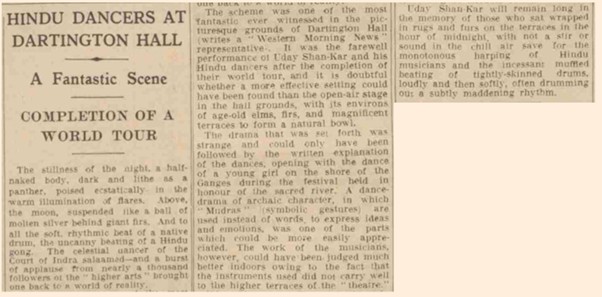Dartington Hall is a splendid old country house.
Its great hall dates from 1388, and has a wonderful hammerbeam roof, an a porch where the arms of Richard II can still be seen. The trouble with keeping old buildings going – when you’re no longer a medieval feudal lord, and when wages have risen – is that upkeep is pretty tough. So it was fortunate that Dartington was bought, in 1925, by Leonard and Dorothy Elmhirst.
The Elmhirsts were interesting. Leonard was from minor English gentry, poor but clearly clever (he completed his degree in agriculture from Cornell in two years). Dorothy inherited at 17 a fortune (about half a billion dollars in todays money). She met Leonard when he was seeking donations to support his club for international students at Cornell. Romance blossomed: they married in 1925.
But before then, Leonard had accepted a job as secretary to Nobel-prize-winning polymath, poet and painter Rabindranath Tagore. This took him to India, where he supported Tagore’s work on rural reconstruction. This influenced him and Dorothy to attempt something similar in the UK, and in 1925 they purchased Dartington Hall. This became a home for all sorts of experimental work – on agriculture and rural economics and society, and also arts and creativity. About 1500 people worked on the estate; it gave concerts (the BBC broadcast the English Singers Quartet on 24 November 1934, and on Saturday 1 December 1934 a concert by Claud Biggs on the piano, accompanying contralto Astra Desmond); and the Western Morning News and Daily Gazette was entranced, on 28 May 1934, with Uday Shan Kar’s Hindu dancing.

In 1935 a charitable trust was established to run the estate, and a a wide variety of activities continued. These included summer schools (such as the Fabian Society school which is pictured on the card), concerts, classes of all sorts. Post war, these activities became more significant: an adult education centre was established in 1955, and in 1961 Dartington College of the Arts was founded. Initially this focused on training teachers in the arts: music, dance and drama, and visual arts.
In 1973 the college gained “assisted” status and received funding from Devon County Council to extend its offer to provide undergraduate degrees. Degrees were awarded by the Council for National Academic Awards (CNAA), the body which awarded degrees across the non-university higher education sector. This was prompted by a shift in government policy to require teacher education to be to degree-level (the first of many such shifts in professional education over the years).
The changes in funding arrangements in the late 1980s – the removal of polytechnics and colleges from local authority control, and the creation of the Polytechnics and Colleges Funding Council – created financial challenges for Dartington, as it lost its special funding. These were addressed by closing some programmes and rationalising others. And again, in 2006, the college faced financial difficulties. Scale appears to have been the problem, exacerbated by the college not owning its buildings and therefore being unable easily to expand student numbers.
This time the problems were insurmountable, and the college merged what was then Falmouth University College, and is now Falmouth University. The provision was moved away from the Dartington site.
But that isn’t the end of the story for higher education at Dartington: Dartington Hall Trust is registered with the Office for Students and established a provider with two faculties: Dartington School of Arts and Schumacher College (each of which continued the work of former colleges associated with the Dartington site).
Back to the postcard: we’ve encountered the Fabians before, in the establishment of the London School of Economics. They seem to have run summer schools at Dartington for several summers in the 1940s at least, but I haven’t been able to track down which one this card depicts. Can anyone recognise any of the earnest (Bevin or otherwise) socialists?
And here’s the jigsaw for you to have a go at. Have fun!













Alas Shumacher College has withdrawn from the provision of higher education.
https://wonkhe.com/wonk-corner/schumacher-college-to-close/
There was one of those glitches with the OfS Register when the Dartington Hall Trust went on. I don’t think they ever got right the advice to providers about trading names. There are plenty of trading names which are not on (Ruskin College, Oxford is not listed as a trading name of UWL for example). But with Dartington they put on all the trading names uses on the estate. So first page of the OfS register webpage offers you Abundant Life as a provider. The register offers you: “This provider trades under the following names: Schumacher College Dartington International Summer… Read more »
I would recomment the excellent book, “The Utopians” by Anna Neima, which has a chapter on Dartington and may provide some context to answer your question?